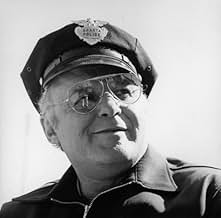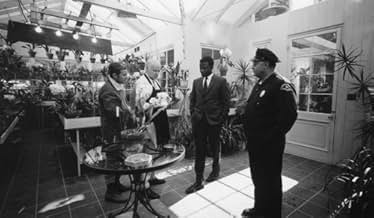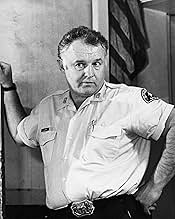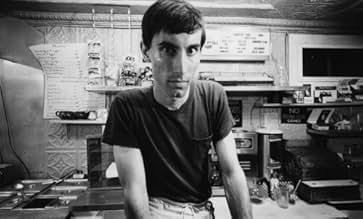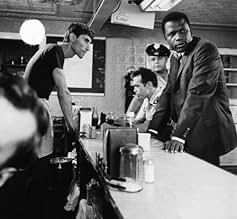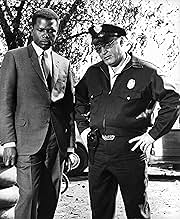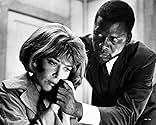Un policía afroamericano tiene que investigar el caso de un asesinato por motivos raciales en una hostil ciudad sureña.Un policía afroamericano tiene que investigar el caso de un asesinato por motivos raciales en una hostil ciudad sureña.Un policía afroamericano tiene que investigar el caso de un asesinato por motivos raciales en una hostil ciudad sureña.
- Dirección
- Guión
- Reparto principal
- Ganó 5 premios Óscar
- 23 premios y 16 nominaciones en total
William Watson
- McNeil
- (as William C. Watson)
Reseñas destacadas
Whether he likes it or not, Sidney Poitier will always be remembered first and foremost as the first black actor to continuously star alongside and above his white counterparts. Just look at the opening credits to "In the Heat of the Night" and you will see that not only does he get an above the title starring credit with method maniac Rod Steiger, but his name also appears first. Something that could have easily been switched around and overlooked considering the importance of each character. But for this socially aware thriller born of the turbulent sixties, it had to be, most definitely, a conscious choice.
For Poitier, this film, along with "Guess Who's Coming To Dinner?", marks the last of his civil rights driven roles in which his character's race is an all important plot element. From "Edge of the City" to "The Defiant Ones", Poitier excelled in bringing intelligent and commanding three dimensional characters to life. A feat he had to succeed at if his films were to gain the trust of a predominantly white audience and push for racial equality. Call him the Jackie Robinson of Hollywood.
When we first see Poitier as Virgil Tibbs, he is stepping off the train in the small Mississippi town of Sparta. Although we can only see him from the waist down, we do get a quick glimpse of his hand and from that we are aware of his race. An important fact for the audience to dwell on later when Rod Steiger as sheriff Gillespie, standing over a dead body on Main Street, and calls for his deputy to round up any strangers for questioning. From that moment on, director Norman Jewison establishes the racial tension that will only grow more and more intense as the film goes on.
Sometimes, the film is far from subtle in exploring the issue of racism. Endicott's plantation, complete with tall white pillars and a black jockey lawn ornament to guard them, is a perfect example. What starts off as a surprisingly civil conversation between Tibbs and Endicott quickly turns heated and unpredictable. From that moment on, the experience will serve to cloud Tibbs' judgment and bring his own flaws to the surface, making him almost as complex a character as Gillespie.
And it is the complexity of Gillespie that got Steiger the Best Actor Oscar over Poitier in 1968. This man has heart, but not made of gold, and his motivations are far from pure. He is simply a man who believes in doing his job, and doing it as just as possible - even if it means arresting a friend for murder. Take for an example the scene in which Tibbs is surrounded by a gang of blood thirsty locals. When Gillespie arrives to save the day, he simply gives them a warning and tells them to go home. It is only when they insult him personally that he becomes angry and takes a swing. His action is just - his motivation almost vain.
In the end, after the murder is solved and racial injustice is swept back under the rug, Tibbs and Gillespie say their farewells and continue on with their very different lives. Each one better off for knowing the other.
Rating [on a 5 star system] : 5 stars
For Poitier, this film, along with "Guess Who's Coming To Dinner?", marks the last of his civil rights driven roles in which his character's race is an all important plot element. From "Edge of the City" to "The Defiant Ones", Poitier excelled in bringing intelligent and commanding three dimensional characters to life. A feat he had to succeed at if his films were to gain the trust of a predominantly white audience and push for racial equality. Call him the Jackie Robinson of Hollywood.
When we first see Poitier as Virgil Tibbs, he is stepping off the train in the small Mississippi town of Sparta. Although we can only see him from the waist down, we do get a quick glimpse of his hand and from that we are aware of his race. An important fact for the audience to dwell on later when Rod Steiger as sheriff Gillespie, standing over a dead body on Main Street, and calls for his deputy to round up any strangers for questioning. From that moment on, director Norman Jewison establishes the racial tension that will only grow more and more intense as the film goes on.
Sometimes, the film is far from subtle in exploring the issue of racism. Endicott's plantation, complete with tall white pillars and a black jockey lawn ornament to guard them, is a perfect example. What starts off as a surprisingly civil conversation between Tibbs and Endicott quickly turns heated and unpredictable. From that moment on, the experience will serve to cloud Tibbs' judgment and bring his own flaws to the surface, making him almost as complex a character as Gillespie.
And it is the complexity of Gillespie that got Steiger the Best Actor Oscar over Poitier in 1968. This man has heart, but not made of gold, and his motivations are far from pure. He is simply a man who believes in doing his job, and doing it as just as possible - even if it means arresting a friend for murder. Take for an example the scene in which Tibbs is surrounded by a gang of blood thirsty locals. When Gillespie arrives to save the day, he simply gives them a warning and tells them to go home. It is only when they insult him personally that he becomes angry and takes a swing. His action is just - his motivation almost vain.
In the end, after the murder is solved and racial injustice is swept back under the rug, Tibbs and Gillespie say their farewells and continue on with their very different lives. Each one better off for knowing the other.
Rating [on a 5 star system] : 5 stars
10bwaynef
One of the great films of the 60s, "In the Heat of the Night" hasn't aged a bit in the four decades since its release and now deserves to be ranked with the great films of all time. Beautifully atmospheric, Haskell Wexler's brilliant cinematography and Norman Jewison's first rate direction make you feel the humidity of the small Mississippi town in which a black detective teams with the redneck sheriff to solve the murder of an important industrialist.
As sheriff Bill Gillespie, Rod Steiger is superb in his Oscar winning role, and this film provides Sidney Poitier with some of his greatest screen moments, including his famous admonition to Steiger that became the title of the less impressive 1970 spin off: "They call me MISTER Tibbs!"
This is one of the few politically correct films to make its point without resorting to heavy-handed, sanctimonious preaching. Stirling Silliphant's Oscar winning screenplay never hits a false note, and the change that occurs in the relationship between the leading characters is subtle, and, therefore, believable. The two stars are ably supported by an outstanding cast of both veterans (Lee Grant, Warren Oates, Beah Richards) and newcomers (Scott Wilson, Quentin Dean, and the delightfully creepy Anthony James). The score by Quincy Jones, featuring Ray Charles' rendition of the title song, captures the proper mood throughout.
In a year when the odds-makers were predicting an Oscar victory for "Bonnie and Clyde" or "The Graduate," "In the Heat of the Night" surprised the prognosticators by taking the Best Picture prize and four other Oscars. Considering its theme of racial tolerance, it seemed an appropriate choice at an Oscar ceremony that was postponed following the assassination of Martin Luther King, Jr. The film's theme made it timely, but its artistry makes it timeless.
The Academy made the right choice.
Brian W. Fairbanks
As sheriff Bill Gillespie, Rod Steiger is superb in his Oscar winning role, and this film provides Sidney Poitier with some of his greatest screen moments, including his famous admonition to Steiger that became the title of the less impressive 1970 spin off: "They call me MISTER Tibbs!"
This is one of the few politically correct films to make its point without resorting to heavy-handed, sanctimonious preaching. Stirling Silliphant's Oscar winning screenplay never hits a false note, and the change that occurs in the relationship between the leading characters is subtle, and, therefore, believable. The two stars are ably supported by an outstanding cast of both veterans (Lee Grant, Warren Oates, Beah Richards) and newcomers (Scott Wilson, Quentin Dean, and the delightfully creepy Anthony James). The score by Quincy Jones, featuring Ray Charles' rendition of the title song, captures the proper mood throughout.
In a year when the odds-makers were predicting an Oscar victory for "Bonnie and Clyde" or "The Graduate," "In the Heat of the Night" surprised the prognosticators by taking the Best Picture prize and four other Oscars. Considering its theme of racial tolerance, it seemed an appropriate choice at an Oscar ceremony that was postponed following the assassination of Martin Luther King, Jr. The film's theme made it timely, but its artistry makes it timeless.
The Academy made the right choice.
Brian W. Fairbanks
IN THE HEAT OF THE NIGHT is a well-crafted murder mystery with a twist. Sidney Poitier is a big city detective wrongfully arrested by a racist small police detachment after the brutal murder of the town's would-be financial savior. Once the matter is resolved and Poitier released, he finds himself aiding his former captors, including Police Chief Rod Steiger, in their quest to get to the bottom of the crime.
An Academy Award winner for Best Picture, IN THE HEAT OF THE NIGHT works on so many levels. It's a solid, unpredictable whodunit with beautiful cinematography and crisp direction from Norman Jewison. All the actors are on top of their games, particularly Steiger, whose not-entirely-likable chief gradually looks past his prejudices to warm up to Poitier. Poitier is his usual superb self, once again maintaining his vast dignity as the target of bigotry, much like he did in THE DEFIANT ONES.
And like THE DEFIANT ONES, a key theme in IN THE HEAT OF THE NIGHT is racism. In fact the racism on display here is so fierce and perverse that it's almost hard to believe (though I'm sure it didn't stretch a thing). You can't help but feel an emotional attachment to Poitier as he's subjected to taunts, attempted attacks, and off-color remarks from those who either don't realize the power of their words or don't care. Poitier proves again why he is perhaps the finest African-American actor ever to grace the screen.
IN THE HEAT OF THE NIGHT is one of those movies that, while not perfect, is impossible to dislike. It's classic, though still relevant, entertainment.
An Academy Award winner for Best Picture, IN THE HEAT OF THE NIGHT works on so many levels. It's a solid, unpredictable whodunit with beautiful cinematography and crisp direction from Norman Jewison. All the actors are on top of their games, particularly Steiger, whose not-entirely-likable chief gradually looks past his prejudices to warm up to Poitier. Poitier is his usual superb self, once again maintaining his vast dignity as the target of bigotry, much like he did in THE DEFIANT ONES.
And like THE DEFIANT ONES, a key theme in IN THE HEAT OF THE NIGHT is racism. In fact the racism on display here is so fierce and perverse that it's almost hard to believe (though I'm sure it didn't stretch a thing). You can't help but feel an emotional attachment to Poitier as he's subjected to taunts, attempted attacks, and off-color remarks from those who either don't realize the power of their words or don't care. Poitier proves again why he is perhaps the finest African-American actor ever to grace the screen.
IN THE HEAT OF THE NIGHT is one of those movies that, while not perfect, is impossible to dislike. It's classic, though still relevant, entertainment.
A well-done film of the raucous Civil Rights era, and should be standard viewing in classrooms.
Here's my breakdown:
STORY: Up front, it's only lightly dramatic, fueled by the socially-supported bigotry of that era.
What's very clever about this film is the way the story reveals itself in stages.
It's one of the best stories in that regard; it actually just gets better as the film progressives.
If you're not interested in the race struggles of that era then this film may not interest you.
ACTING: Even with a swath of "dumb redneck" characters, the whole cast are believable and hold their characters well.
Of course, Poitier and Steiger are simply awesome on their own and fireworks together. Really superb blend.
TEMPO: An excellent pace with nothing hyper or dull. With Steiger there's a lot of yelling (as was his custom).
CINEMATOGRAPHY: Love old films, and settings all by themselves. If you want to step back into time and literally see what the "Old South" was like, watch this.
DIRECTING / WRITING: Excellent directing and writing ... so much attention to detail and the handling of the subject. My only critique is the screenplay was written by a man who did so primarily for TV, and it occasionally shows.
Is it a very good film? Yes.
Should you watch this once? A must.
Rating: 8.1.
Here's my breakdown:
STORY: Up front, it's only lightly dramatic, fueled by the socially-supported bigotry of that era.
What's very clever about this film is the way the story reveals itself in stages.
It's one of the best stories in that regard; it actually just gets better as the film progressives.
If you're not interested in the race struggles of that era then this film may not interest you.
ACTING: Even with a swath of "dumb redneck" characters, the whole cast are believable and hold their characters well.
Of course, Poitier and Steiger are simply awesome on their own and fireworks together. Really superb blend.
TEMPO: An excellent pace with nothing hyper or dull. With Steiger there's a lot of yelling (as was his custom).
CINEMATOGRAPHY: Love old films, and settings all by themselves. If you want to step back into time and literally see what the "Old South" was like, watch this.
DIRECTING / WRITING: Excellent directing and writing ... so much attention to detail and the handling of the subject. My only critique is the screenplay was written by a man who did so primarily for TV, and it occasionally shows.
Is it a very good film? Yes.
Should you watch this once? A must.
Rating: 8.1.
Whodunits are a dime a dozen in my view.What makes In the Heat of the Night so unique in the murder mystery genre is it's setting:The racially tense deep south.This is what I enjoy about the film.You have two major plot lines to keep you engrossed:The investigation into the murder itself,and the racial tensions between Sidney Poitier's Virgil Tibbs character and virtually every other character in the film.The film is loaded with great acting,particularly from Poitier,who,not surprisingly,considers this his best work and is his favorite amongst all the projects he has done.Not only is this recommended viewing,it is recommended for a spot on your home video shelf.
Oscars Best Picture Winners, Ranked
Oscars Best Picture Winners, Ranked
See the complete list of Oscars Best Picture winners, ranked by IMDb ratings.
¿Sabías que...?
- CuriosidadesSidney Poitier insisted that the movie be filmed in the North because of an incident in which he and Harry Belafonte were almost killed by Ku Klux Klansmen during a visit to Mississippi. That's why Sparta, IL, was chosen for location filming. Nevertheless, the filmmakers and actors did venture briefly into Tennessee for the outdoor scenes at the cotton plantation, because there was no similar cotton plantation in Illinois that could be used. Poitier slept with a gun under his pillow during production in Tennessee. He did receive threats from local racist thugs, so the shoot was cut short and production returned to Illinois.
- PifiasThe police chase Harvey Oberst through the yellow leaves of an autumn forest, clearly indicating that it is not the middle of summer, as claimed in the movie. This film takes place in September, as indicated by the calendar in the Sheriff's office and not summer.
- Citas
Gillespie: Virgil? That's a funny name for a nigger boy that comes from Philadelphia. What do they call you up there?
Virgil Tibbs: They call me MISTER TIBBS!
- Créditos adicionalesNo uppercase ("capital") letters are used in the opening and closing credits, including the film's title, cast and characters, crew and job titles, and company credits.
- Versiones alternativasThe VHS prints use the 1982 United Artist variant.
- ConexionesFeatured in Film Review: Film Review (1967)
- Banda sonoraIn the Heat of the Night
Music by Quincy Jones (uncredited)
Lyrics by Alan Bergman (uncredited) and Marilyn Bergman (uncredited)
Sung by Ray Charles
Selecciones populares
Inicia sesión para calificar y añadir a tu lista para recibir recomendaciones personalizadas
Detalles
- Fecha de lanzamiento
- País de origen
- Idioma
- Títulos en diferentes países
- En la calor de la nit
- Localizaciones del rodaje
- Sparta, Illinois, Estados Unidos(Sparta, Mississippi)
- Empresa productora
- Ver más compañías en los créditos en IMDbPro
Taquilla
- Presupuesto
- 2.000.000 US$ (estimación)
- Recaudación en todo el mundo
- 27.669 US$
- Duración1 hora 50 minutos
- Color
- Relación de aspecto
- 1.85 : 1
Contribuir a esta página
Sugerir un cambio o añadir el contenido que falta




